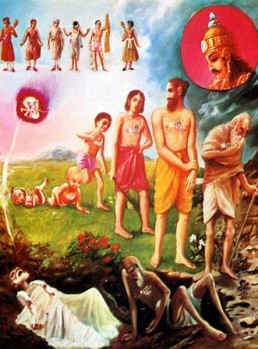Swami Chinmayananda Commentary
The two earlier stanzas from Arjuna, no doubt, indicate to us the state of perplexity and confusion in his ‘objective-mind.’ That the state of hysteria within has now developed to attack even his intellectual composure is indicated in this stanza. The stimuli coming from the array of the enemy-lines, as they touched his ‘objective-mind,’ created therein a problem, to solve which, he needed the guidance of the rational capacities of his intellect — the ‘subjective-mind.’ Split as he was within, his mental personality, divorced from his intellect, could not easily come to any definite decision. His egoistic self-evaluation and the ego-created intense anxieties for the fruits of the great war, stood, as it were, between his mind and intellect, separating them and creating between them, an almost unbridgeable gulf; hence, Arjuna’s confusions here.
The mind, generally functioning as an efficient “receiving-and-despastching-clerk,” receives the information of the perceptions conveyed to it by the sense-organs, and after arranging these perceptions in order, conveys them to the intellect for its judgement. The intellect, with reference to its own stored-up memories of similar experiences in the past, comes to final decisions which are conveyed to the mind for execution; and the mind in its turn issues the necessary orders for the organs-of-action to act upon. All these are happening at every moment, all through our waking-state, in our intelligent existence in the midst of the objects of the world.
Where these equipments are not functioning co-operatively, with perfect team spirit, the personality of the individual is shattered and he becomes inefficient in meeting life as a victorious mortal. The rehabilitation of that individual is the re-adjustment and re-education of his inner world and where his personality is once again tuned up and adjusted, he comes to exhibit better efficiency in life.
Poor Arjuna, victimised not so much by the external world as by his own mental condition, is seen here as being incapable of judging whether he should conquer his enemy or, by an ignoble retreat, allow them to conquer him. In this stanza, Vyasa is indicating to us that the hysteria in Arjuna was not only mental, but also at the level of the intellect.
Adi Sankara Commentary
Sri Sankaracharya did not comment on this sloka. The commentary starts from 2.10.
The Bhagavad Gita with the commentary of Sri Sankaracharya – Translated by Alladi Mahadeva Sastry
Holy Geeta – Commentary by Swami Chinmayananda
The Bhagavad Gita by Eknath Easwaran – Best selling translation of the Bhagavad Gita
The Bhagavad Gita – Translation and Commentary by Swami Sivananda
Bhagavad Gita – Translation and Commentary by Bhaktivedanta Swami Prabupadha
Srimad Bhagavad Gita Chapter 2 – Verse 6 – 2.6 na chaitadvidmah – All Bhagavad Gita (Geeta) Verses in Sanskrit, English, Transliteration, Word Meaning, Translation, Audio, Shankara Bhashya, Adi Sankaracharya Commentary and Links to Videos by Swami Chinmayananda and others – 2-6

